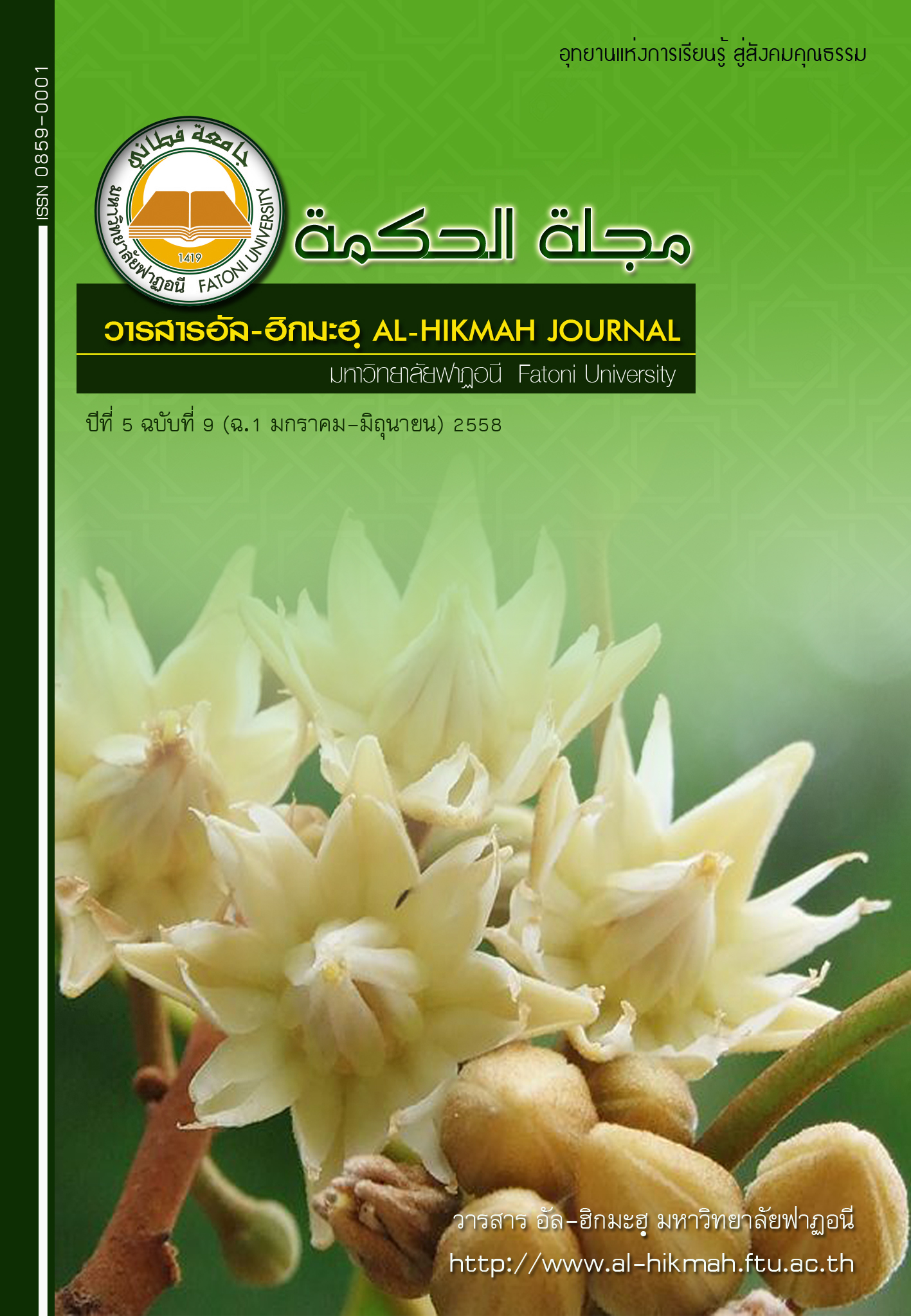The Rights of Wives to be Divorced in Islamic Law: A Case Study in Yala
Keywords:
The Rights of Wives, Divorced, Islamic LawAbstract
The objectives of this research were to study 1) the grounds that Islam endorses muslim wives to dissolve marriage, 2) reasons which muslim wives in Yala claimed to dissolve their marriage, and 3) their rights after being divorced and effects of divorce. A questionnaire and interviews were used as instruments of the study. A sample of 50 wives in Yala who used the rights during the three-year period answered the questionnaire while a representative from Yala Islamic Committee Office was interviewed. The data obtained were then analysed using the SPSS for descriptive statistics such as frequency and percentage in order to interpret meaning of the data.
It was found that wives can claim their rights to be divorced when they experience either one or a combination of the following conditions: the husband becomes impotent, not responsible, cruel, is physically or mentally harmful to wife, disappeared, or imprisoned. While considering the causes where wives in Yala used to claim their right, this study found that their husbands failed to feed the family, were aggressive physically and verbally, were drug addicts, respectively. Overall, the divorced affected those who used the right in terms of health, social and economic aspects. The wives should be given living sustenance which include clothes and accommodation as well as sustenance for children after divorce. However, it was revealed that most divorced wives did not get what Islam has sanctioned.
References
อัชชัรบีนี, ชัมซฺอัดดีน มุหัมมัด บิน อะหมัด อัลเคาะฏีบ. 1994. มุฆนีอัลมุหตาจญ์. พิมพ์ครั้งที่ 1. เบรุต. ดาร อัลกุตุบ อัลอิสลามียะฮ.
อัซซิยูฏี, ญะลาลอัดดีน อับดฺอัรเราะมัน. ม.ป.ป. อัลอัชบาฮวันนะซออีร. มักตะบะฮ วะมัฏบะอะฮ มุหัมมัด อัลฮินดฺ.
อัดดุซูกี, มุหัมมัด บิน อะหมัด บิน อุรฟะฮ. ม.ป.ป. หาชิยะฮอัดดุซูกีอลาอัชชัรหฺอัลกะบีร. เบรุต. ดาร อัลฟิกรฺ.
อิบนุกุดามะฮ, อบูมุหัมมัด มุวัฟฟิก อัดดีน อับดุลลอฮ บิน อะหมัด บิน มุหัมมัด. 1968. อัลมุฆนี. เบรุต. ดาร อัลกิตาบ อัลอะเราะบี.
อิบนุมาญะฮ, อิบนุอับดุลลอฮ มุหัมมัด บิน ยะซีด. 1952. สุนันอิบนุมาญะฮ. เบรุต. ดาร อัลฟิกรฺ.
อบูซะเราะฮ, มุหัมมัด. 1957. อัลอะหวาลอัชชัคศียะฮ. พิมพ์ครั้งที่ 2. ดาร อัลฟิกรฺ อัลอะเราะบิ.
อัรรอมลี, ชัมซฺอัดดีน มุหัมมัด บิน อบี อัลอับบาส. 1993. นิฮายะฮอัลมุหตาจญ์. เบรุต. ดาร อัลกุตุบ อัลอิสลามียะฮ.
อัลกุรฏุบี, อบีอับดุลลอฮ บิน อะหมัด อัลอันศอรี. 1966. อัลญามิอฺลิอะหกามอัลกุรอาน. พิมพ์ครั้งที่ 3. ดาร อัลเกาะลัม.
อัลบุคอรี, มุหัมมัด บิน อิสมาแอล อบูอับดฺอัลลอฮ. 1979. อัลญามิอฺอัศเศาะเหี๊ยะห. อิสตานบูล ตุรกิยา. อัลมักตะบะฮ อัลอิสลามียะฮ.
อัลบักรฺ, ซัยดฺ มุหัมมัด ชะฏอ อัดดุมยาฏี. 1938. อิอานะฮอัฏฏอลิบีน. พิมพ์ครั้งที่ 2. มิศรฺ. มัฏบะอะฮ มุศเฏาะฟา อัลบาบี อัลหะละบี.
อัลบัยฮะกี, อะหมัด อิบนฺ อุเซ็น. 1994. สุนันอัลบัยฮะกี. พิมพ์ครั้งที่ 1. เบรุต. ดาร อัลกุตุบอัลอิลมียะฮ.
อัลญะซีรี, อับดฺอัรเราะหมัน. 1969. อัลฟิกฮฺอลาอัลมซาฮิบอัลอัรบะอะฮ. เบรุต. ดาร อัลฟิกรฺ.
อัศศอบูนี, อับดฺ อัรเราะมัน. 1968. มดาหุริยยะฮอัซเซาญัยนฺฟิอัฏเฏาะล๊าก. พิมพ์ครั้งที่ 2. เบรุต. ดาร อัลฟิกรฺ.
อลี, เกาษัร กามิล. ม.ป.ป. ศูมูอัตตัชรีอฺอัลอิสลามฟิมุอาละญะฮอันนุชูซอัชชิเกาะฮบัยนฺอัซเซาญัยนฺ. อัลกอฮิเราะฮ. ดาร อัลอิตติซาม.
ซาบิก, ซัยดฺ. 1977. ฟิกฮฺอัซซุนนะฮ. พิมพ์ครั้งที่ 4. เบรุต. ดาร อัลฟ



